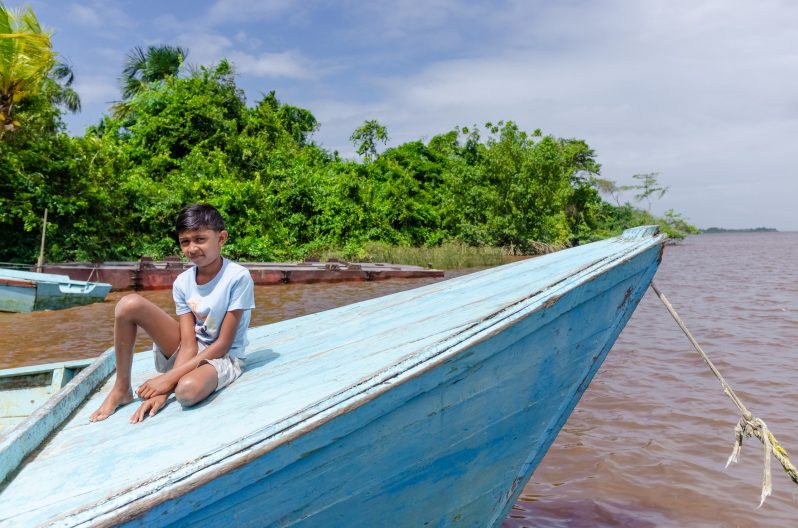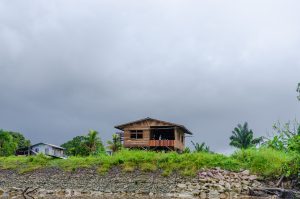By Michel Outridge
This week the Pepperpot Magazine also visited Quarter Benabo Island, one of the 365 islands in the Essequibo River and Lower Bonasika Creek, which is a tributary of the Essequibo River.
QUARTER Benabo Island is 20 minutes via boat from Fort Island and it is home to eight families, who are cash-crop farmers, cattle and livestock farmers, fishermen and other skilled folk.
The island is very large but it is like a swamp with no drainage and irrigation for water to recede from the island, which makes it inaccessible for walking.
Quarter Benabo Island is the home of plantains, bananas, ground provisions, citrus and other fruits and cash crops.
The water coconuts on this island hold a lot of water, from one coconut you can get three and a half glasses of fresh water to indulge.
Any movement around this island is by boat and the people are very friendly and welcoming.
There is no potable water supply, no electricity, no internet nor cable services, but the internet can be accessed via cell phones.
The nearest health post is at Morashee across the river from Quarter Benabo Island and people would utilise the services there and also at the Fort Island Health Centre.
This island doesn’t have a village leader of a Community Development Council (CDC), but the residents said during the rainy season it is challenging for them because the place is very wet, inundated and muddy and the cows would get stuck for days.
Hard work pays off
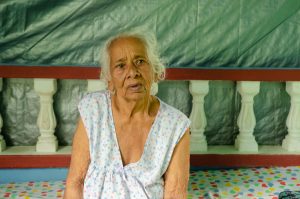
One of the eight residents of this island is Mahadeo Teehal better known as “Tony”, who is a farmer of cash crops, livestock, cattle and very much an all-rounder, who does multiple jobs to ensure that his family is well taken care of.
The father of five told the Pepperpot Magazine that 26 years ago he relocated to Quarter Benabo Island when his grandfather passed away.
His grandfather passed away 35 years ago and there was a house, but it was old and the building was just sitting there, rotting away.
It was years after Teehal decided to move there with his family and start his life anew.
Teehal reported that back then the place was overrun by thick jungle and he had a lot of clearing to do to build up the land to what it is today, because when the tide is high the place would be flooded.
He added that before he relocated to the island and settled he was living in Lower Bonasika Creek and he did some logging then and that’s how he met his wife, who is from Baboon Hole Island.
Teehal used to visit Baboon Hole Island to cut logs and it was there he saw the woman who would later become his wife.
The 48-year-old is the father of four boys and one girl and has one granddaughter and they live in an extended family setting with his wife’s ailing mother, who has a small cottage nearby.
“My sons would assist me to do a lot and they hold their own with their boat in which they would use to transport cows from one point to another on hire and they would help take care of the livestock and poultry and also lend a hand on the farm,” he said.
Teehal stated that life on the island is not ‘a bed of roses’ but with hard work, life can be comfortable although they don’t have the facilities needed to enhance their lives.
He added that they use solar power or generator and to move around via boat it is quite costly to buy gas, but they have no other choice.
‘To survive on this island you have to work with yourself so I have my farm, mind a few cows, sheep, ducks, and chickens, because you have to do more than one thing to make it financially,” he explained.
Teehal told the Pepperpot Magazine that the island is transported land owned by his grandfather and was landed down to him and he has 26-acres of land behind his house, which he built from scratch.
He disclosed that he invested a lot to upkeep the place and to have it as it is today with a landing and everything.
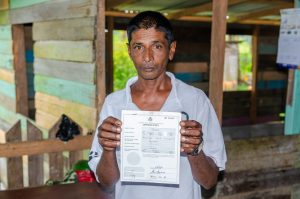
“It took me 10 years to get this place to my liking and it wasn’t easy, but I am proud of my achievement and happy that my children are with me and they assist me a lot in keeping this place tidy,” he said.
Teehal revealed that his children are his greatest assets because they work with him and they are very willing children, who still honour him to date.
As for drinking water, he reported that they would store rainfall water in black tanks, but when the dry season is on they have to use river water to do chores and they buy drinking water.
Teehal added that being self-employed is the best option for him; although it is hard work and no day off it is better, because they do things the way they prefer.
He pointed out that they eat farm-fresh, organic fruits and vegetables from the farm and they would use chickens from the backyard to use in the kitchen, so they hardly ever buy things for cooking since they use whatever they have.
Teehal however, would like to have an internet hub on the island because they have a lot of school-age children, who do not have access to the internet; as such, they are left behind in terms of school work.
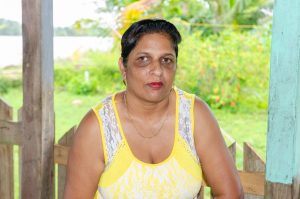
Teehal’s mother-in-law is Rookmin (only name) and she is 69 years old, an elder on the island, who has not been in good health for some time.
She is from Baboon Hole Island, but came to live with her daughter after falling ill and she is being cared for by her daughter and granddaughter.
Teehal’s wife, Rena Ramrattan, is a very quiet but friendly woman, who is always in the kitchen cooking from her fireside and keeping the place clean.
She goes to Parika to do shopping every two weeks and enjoy the quiet island life which is breezy and scenic, their house overlooks the Essequibo River.
Being a housewife, Ramrattan said she would get up early to prepare meals for the family before they go off to work and ensures that there is always food in the pot.
“My daughter and daughter-in-law are very helpful to me and they assist me in the chores and cooking daily, so I am quite pleased to get help,” she said.
She stated that she has no complaints where her children are concerned, because they are obedient and very good.
Lower Bonasika Creek
At Lower Bonasika Creek the Pepperpot Magazine met the Ramrattan family, who are farmers but as a result of heavy rainfall, the team was unable to venture further down the creek as was expected.
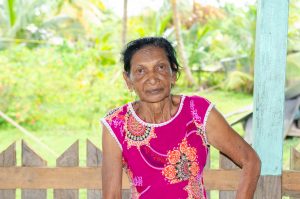
The boat the team was in had to be bailed of water a few times and we sought shelter for some time before making our way out the creek.
However, the team reached the home of a resident, who is head of the household, he is Vivian Ramrattan, 67, a farmer, who is ailing and depends on his wife and children to support him.
He told the Pepperpot Magazine that he used to be a security guard attached to the Primary School in the community, but after he fell ill he was forced to stop working.
The father of four said one of his sons resides with him and he would assist on the farm along with his grandson and wife.
Collectively they are also caring for his elderly mother, who is also ill. She is Rajpattie Reece, 88.
This family has a cultivation of plantains, bananas, ground provisions, pumpkins and limes at the back of their yard and would sell their produce at Hubu Koker or Parika.
Ramrattan’s wife, Dularie, 63, is the backbone of the family; she does the work in the backlands and also assists in the kitchen.
She is originally from Lanaballi, Essequibo River, but after marriage 40 years ago she relocated to Lower Bonasika Creek.
After her husband suffered a stroke, she had to step up and assist with the farm and also help care for his ailing mother.
This riverine community doesn’t have potable water supply, no electricity nor internet services and it is remote.
In Bonasika Creek people live on both banks of the creek, which runs down to the savannah area where there is a koker, for many miles.
The only mode of transportation is by boat and they use a generator or solar energy to power appliances and get lights at nights.
Bonasika Creek has a nursery, a primary school and a health centre near the school compound with an upgraded landing.
The community has a police outpost at Upper Bonasika Creek.
The people are very welcoming and would not hesitate to offer you a drink of beverage or a place to sit and chat.




.jpg)



